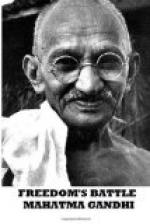SPEECH AT TRICHINOPOLY
Mahatma Gandhi made the following
speech at Trichinopoly on the 18th
August 1920:—
I think you on behalf of my brother Shaukat Ali and myself for the magnificent reception that the citizens of Trichinopoly have given to us. I thank you also for the many addresses that you have been good enough to present to us, but I must come to business.
It is a great pleasure to me to renew your acquaintance for reasons that I need not give you. I expect great things from Trichinopoly, Madura and a few places I could name. I take it that you have read my address on the Madras Beach on non-co-operation. Without taking up your time in this great assembly, I wish to deal with one or two matters that arise out of Mr. S. Kasturiranga Iyongar’s speech. He says in effect that I should have waited for the Congress mandate on Non-co-operation. That was impossible, because the Mussulmans had and still have a duty, irrespective of the Hindus, to perform in reference to their own religion. It was impossible for them to wait for any mandate save the mandate of their own religion in a matter that vitally concerned the honour of Islam. It is therefore possible for them only to go to the Congress on bended knees with a clear cut programme of their own and ask the Congress to pronounce its blessings upon that programme and if they are not so fortunate as to secure the blessings of the National Assembly without meaning any disrespect to that assembly, it is their bounden duty to go on with their programme, and so it is the duty of every Hindu who considers his Mussalman brother as a brother who has a just cause which he wishes to vindicate, to throw in his lot with his Mussalman brother. Our leader does not quarrel with the principle of non-co-operation by itself, but he objects to the three principal details of non-co-operation.
COUNCIL ELECTIONS
He considers that it is our duty to seek election to the Councils and fight our battle on the floor of the Council hall. I do not deny the possibility of a fight and a royal fight on the Council floor. We have done it for the last 35 years, but I venture to suggest to you and to him, with all due respect, that it is not non-co-operation and it is not half as successful as non-co-operation can be. You cannot go to a class of people with a view to convince them by any fight—call it even obstruction—who have got a settled conviction and a settled policy to follow. It is in medical language an incompatible mixture out of which you can gain nothing, but if you totally boycott the Council, you create a public opinion in the country with reference to the Khilafat wrong and the Punjab wrong which will become totally irresistible. The first advantage of going to the Councils must be good-will on the part of the rulers. It is absolutely lacking. In the place of good-will you have got nothing but injustice but I must move on.




